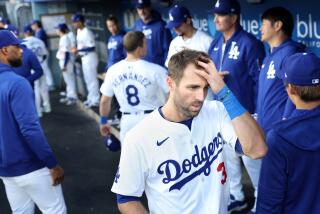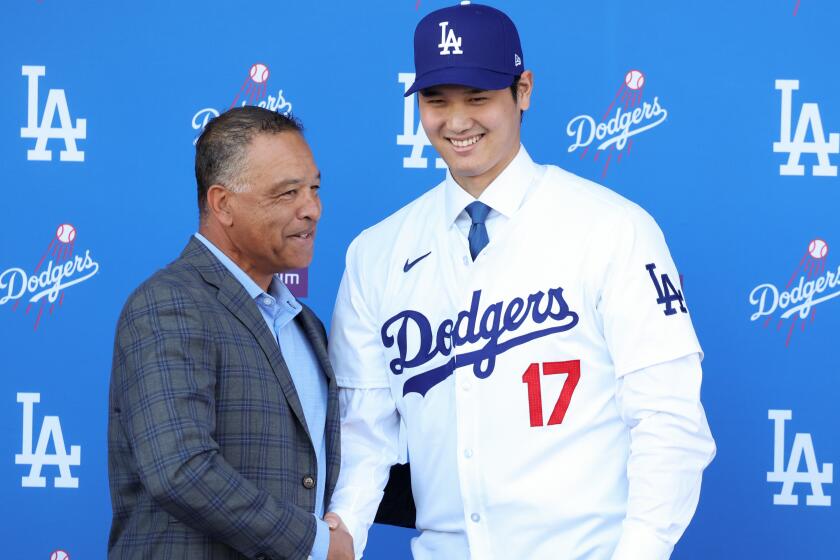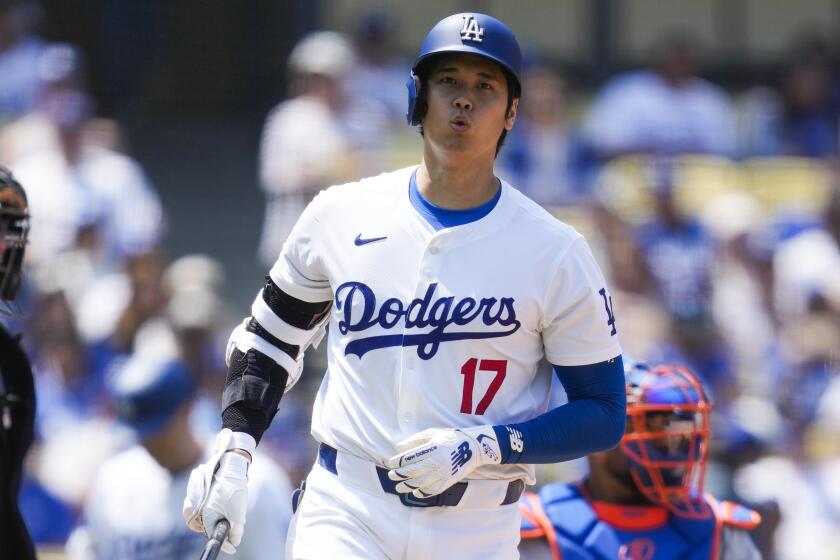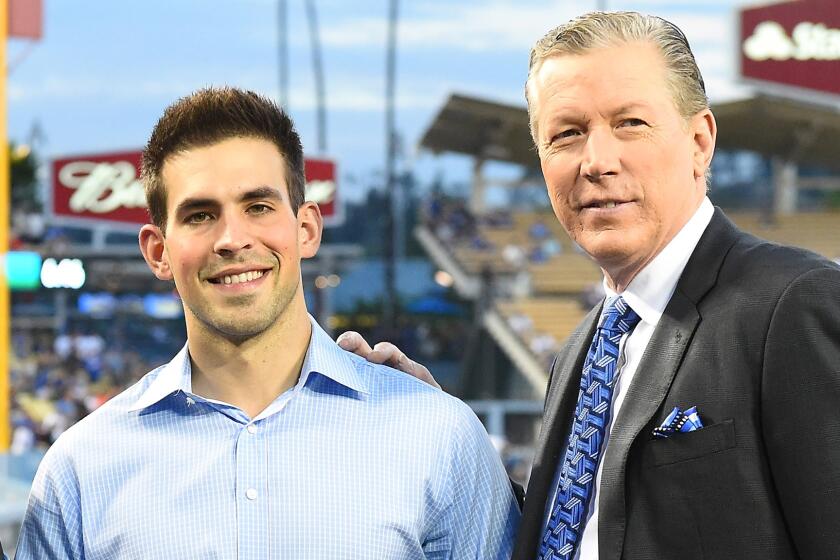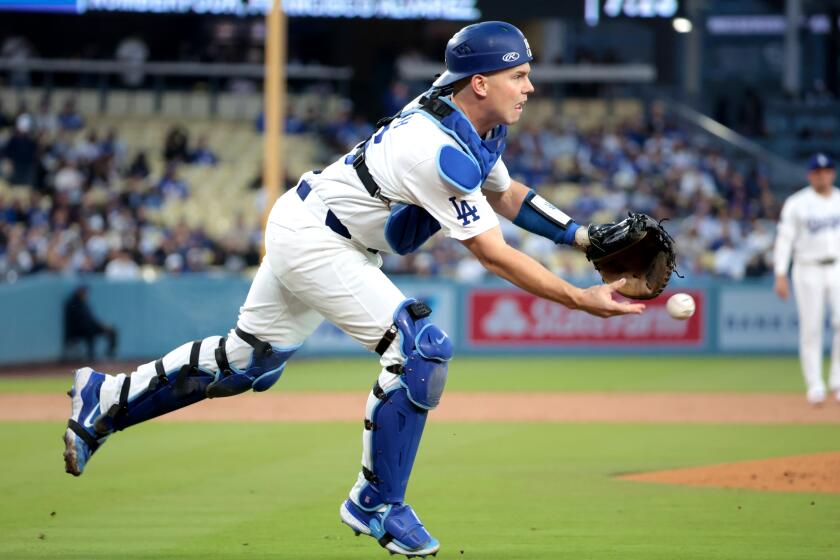Thrilled
Twenty five years ago, on one of the longest nights in franchise history, a Dodgers executive claimed on national television that blacks did not have the “necessities” to run a baseball team.
On Tuesday, Don Newcombe received a phone call that dawn had finally broken.
The Dodgers had been purchased by a group that included an African American, and the team’s closest living connection to Jackie Robinson swallowed hard and rubbed his eyes into the light.
“This is one of the most magnificent things that could have ever happened,” Newcombe said. “For people like me, it’s been a long, long time coming.”
Although the most closely examined pieces of this week’s Dodgers purchase have been about money and personality, none resonate through history like the component involving race.
A franchise that broke baseball’s color barrier with Robinson in 1947 had stopped there. The Dodgers have amazingly never had a black general manager, black manager or even a black third base coach.
When an African American named Magic Johnson was a part of a Guggenheim Baseball Partners group that bought the team for $2.15 billion, not only had a credibility gap been leaped, but a cultural hurdle had been cleared.
Newcombe is 85, but when talking about Johnson his voice fills with power, emotion and hope, the giddiness of a city swirling through the elegant icon in the pressed suit and Panama hat.
“I don’t care what context he’s coming in under, the bottom line is, he’s here, it’s happened, it’s amazing,” Newcombe said. “I wish Magic was a beautiful woman, I’d kiss him in the mouth.”
That the franchise’s second-most enlightened moment occurred on a noted anniversary of its most ignorant moment is not only wondrous in its achievement but startling in its symmetry.
Twenty five years ago, on a “Nightline” television appearance celebrating the 40th anniversary of Robinson breaking the color barrier, legendary Dodgers general manager Al Campanis was asked a pointed question by host Ted Koppel.
Why is it, said Koppel, “that there are no black managers, no black general managers, no black owners?”
Campanis gave an answer that still ominously resonates today.
“I truly believe that they may not have some of the necessities to be, let’s say, a field manager, or perhaps a general manager,” he said, later adding, “Why are black men or black people not good swimmers? Because they don’t have the buoyancy.”
Newcombe, a former Dodgers pitching great who was once Robinson’s roommate, watched the taped interview on a television in his Sacramento hotel room with shock. It was Newcombe, not Campanis, who had been booked to represent the Dodgers on the show. Yet, Newcombe’s plane was delayed and he was stuck on a tarmac when he should have been in front of a camera.
After the Dodgers’ season-opening win in Houston, against the advice of then-Dodgers publicity director Steve Brener, the tired and unprepared Campanis agreed to serve as a last-minute substitution. The rest became ugly Dodgers history.
Campanis claims he used words that were misinterpreted -- “I meant ‘necessities’ as necessary experience,” he once told me -- but the message was clear, and after 44 years in the organization, Campanis was forced to resign two days later.
“I saw it on a hotel television and I said to myself, out loud, ‘Al, you screwed up, but I still love you,’ ” Newcombe said. “I respected Al then, and I’ll respect him forever.”
Newcombe had seen how Campanis had taught Robinson to play second base in the minor leagues. Like other Dodgers pioneers, he never believed Campanis was racist.
“I know he did not have a racial bone in his body,” Newcombe said. “Jackie never mentioned it, Roy [Campanella] never mentioned it, they were always positive about Al, so am I.”
Yet, despite the Dodgers outrage over the comments, for the next 25 years those words continued to echo. Though there have been World Series titles won by African American managers and directed by African American general managers, the Dodgers have employed neither. Currently, the highest ranking black Dodgers baseball executives are player development director De Jon Watson and pro scouting director Vance Lovelace.
“Jackie Robinson, Frank Robinson, myself, we’ve all made suggestions to the organization about improving diversity at the highest levels, but it’s never happened,” Newcombe said. “If Magic does open the door to more diversity, and I hope it does, it should have happened a long time ago.”
Several years ago, in one of his best moves, Frank McCourt made Newcombe a special advisor to the chairman. Newk attends most home games, standing behind the cage during batting practices and advising players.
This spring, he and fellow former Dodger Lou Johnson addressed the Dodgers about alcohol-abuse awareness, an issue he hopes that Major League Baseball will confront by allowing them to give their speeches elsewhere around the league.
But for now, he can’t wait to greet the new boss.
Magic Johnson tried to phone Newcombe shortly after being awarded the team, but the number was wrong. Johnson’s representatives tracked down Newcombe later and set up a time for the two men to chat.
That won’t be simply a conversation, it will be a chapter in a Dodgers history book.
“Imagine that, Magic Johnson suddenly owns the Dodgers and he is saying he will not forget about Don Newcombe,” said Newcombe, his voice cracking. “Makes you proud to be a Dodger. Makes you proud to be an American.”
--
twitter.com/billplaschke
More to Read
Are you a true-blue fan?
Get our Dodgers Dugout newsletter for insights, news and much more.
You may occasionally receive promotional content from the Los Angeles Times.

